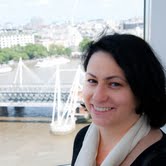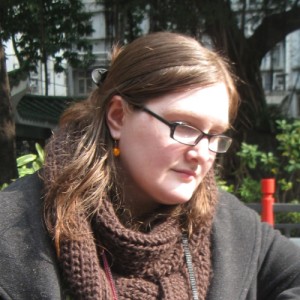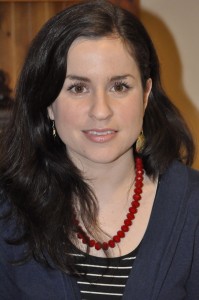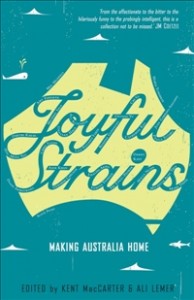 Genevieve L. Asenjo is Honorary Fellow in the Fall 2012 International Writing Program (IWP) of the University of Iowa in Iowa City, USA. Author of four books, she writes poetry, fiction, and novel in three Philippine languages and directs Balay Sugidanun (House of Storytelling), an online platform on Mother Tongue. She teaches literature and creative writing at De La Salle University in Manila, Philippines.
Genevieve L. Asenjo is Honorary Fellow in the Fall 2012 International Writing Program (IWP) of the University of Iowa in Iowa City, USA. Author of four books, she writes poetry, fiction, and novel in three Philippine languages and directs Balay Sugidanun (House of Storytelling), an online platform on Mother Tongue. She teaches literature and creative writing at De La Salle University in Manila, Philippines.
She arrived as a guest and departed as an accomplice to a crime, after sitting down to a dinner of pinakbet and sinigang with the Kim family.
At least, that’s what she tells me in between mouthfuls of peanuts and potato chips. We are at Janga Norebang in Koejong.
Listen. One night in this Korean family’s typical apartment in Busan, tap water was gushing from the faucet onto the sink. There was something being washed, something boiling, something being cooked into pinakbet and sinigang. Presiding over this, all at the same time, was Neneng Delia, the Filipina wife of a Korean.
Look at her, that guest I mentioned who is beside me right now, sitting at the table around the corner from the sink and stove where Neneng remained standing. Across from her, on the other side of the table, sat the Korean, the husband. On the other end, the remaining half of the room. On display were a digital TV and framed pictures of the Kim family wearing hanbok, the traditional attire worn during celebrations like Chuseok, the harvest festival. There was a piano. Eight-year-old Ji-eun was playing a tune she recognized, Beethoven’s “Moonlight Sonata.”
Anyway, she continues, she kept on glancing at Neneng. She was convinced of the woman’s beauty; more so before, but even until now, with that face worthy of a celebrity, her long hair and curvaceous body. In her black slacks and blue floral blouse, the woman looked her age, well past forty-five. She tells me those glances were a plea for help, she was listening to the woman’s husband, who was speaking to her—eye to eye—in phrases which Neneng quickly translated into English, some into a mix of Tagalog and Hiligaynon.
Such as: ‘My husband says you’re pretty. Bakit daw I’m not more like you?’
She says she then felt the crushing of tomatoes, of squash, of okra in her chest. Even persimmon, which she had first seen in this country and delighted in.
But she says she understands Neneng, all the more now. It’s why she had invited us here. The thing is, Neneng couldn’t come. Not even belatedly, like the others. They say they’re almost here.
Neneng and I have known each other for five years. We have this group of English teachers who married Koreans here in Busan. I know her husband too, Leo (his English name). Bald, a little pudgy. Smiles a lot. I can imagine his face, his eyes turning into slits as he talked to this girl. There are some people for whom a smile is the equivalent of a hello, and perhaps on that night, since his wife was again cooking pinakbet and sinigang, out of joy at having met another Filipina friend, because of that, everything was okay between them. This, despite reports from the group that her husband had been laid off by the shipping company. Despite the fact that some days Ji-eun came home from school to complain that her classmates were teasing her: ‘Nunon african saram ida. Pibuga sikumota!’ (You are African. Your skin is dark!)
They had met on the subway, Neneng and this girl, whom I first encountered during Independence Day this year; she had been in my Pandanggo sa Ilaw dancing group. The two of them shared the same route—Sinpyeong, Hadan, Tangni, Saha, Koejong, Seomyeon—and the same work hours: 10 in the morning until 6 in the evening. Their hagwon stood near each other. ‘Come over to my house,’ the woman had eagerly invited, ‘I’ll cook pinakbet and sinigang for you.’ Turned out they were both Ilonggo, and anyway how could she decline an invitation from an older Filipina, especially one involving such scrumptious dishes? Was she also a wife? No, she had answered, a new recruit actually, here to struggle after two years of tutoring Korean students in Iloilo. Her seaman boyfriend had gotten another girl pregnant. Geu saram, she had said, her drama here would involve fixing a broken heart.
Song: (그 사람) Geu Saram/That Person
Artist: Lee Seung Chul
This was how she got me here. She has already memorized it from watching Baker King. Another can of beer each, another plate of peanuts, then we play the song.
‘Saranghae, I also love my husband,’ I tell her. ‘Love can be developed too, that’s not just for photos.’
Hahahaha.
Hehehehe, she adds.
‘Yes, my shi-omoni is nice enough. But of course mothers-in-law always treat you like a maid, especially during Chuseok.’ I down my beer and signal for another one.
Something else happened during that visit, she adds. After dinner, after Neneng finished washing and cleaning up, still in her black slacks and blue floral blouse and still refusing her help, they had norebang on the digital TV in the living room.
Here’s the scenario. The girl, sitting over there. The Korean, on the floor beside his daughter, in his shorts and t-shirt. And Neneng? She’s the one holding the microphone, crooning and swaying to “Bakit” by Imelda Papin.
Clap, clap, clap.
Neneng’s husband was very amused. Imagine Neneng’s long hair shimmying to the rhythm of her curvy body, as if she was not the Neneng we earlier saw cooking and translating her husband’s compliments to this girl: that she’s probably very smart because she had managed to come to Korea even without a Korean boyfriend or husband, that if he and Neneng were divorced, or if he was wealthy, he would woo her and take her to Jeju Island, where he once traveled for work, and where well-heeled Koreans go for vacations.
She says she replied, as a plea to Neneng to change the topic, that there are many beautiful seas in the Philippines, which is why many Koreans go there, when was the last time they had a vacation, or when will they go for one?
Apparently she sweated so much that night, that if it had gone on she would have developed rashes. The daughter’s playing the piano as her parents were committing a crime! All this because she turned up. This knowledge pinned her to her seat. There was some illicit irony in what was happening in that household at that moment: she had to help Neneng amuse a husband who’d recently lost his job, she had to be there as both viewer and witness to Neneng’s Koreanovela, because indeed what else was she to do in this country, unmarried?
Yes, she understands now, this was why Neneng had invited her, not just because they’re from the same country, or perhaps precisely because of that, the woman saw her as the perfect accomplice (the word ‘victim’ seems too harsh). So then, Neneng was able to sing her heart out, to croon and sway seemingly without a care for today or tomorrow because, isn’t it true, her husband and daughter adored her in those moments, and as for her presence there, a fellow Filipina who might give ridicule or insult, so what? You too, her swaying seemed to say, you too will experience this strange sorrow and loneliness when the trees start shedding their leaves, you too will sob during nights and mornings as if someone had hewn into a part of your throat, as if someone had stolen your gold, and you will remain restless until you take a gulp of sinigang. This will repeat itself, through the four cycles of seasons; will be veiled by busyness but will never disappear, so that you too will say yes, it’s still better in the Philippines, especially in the province, it really is good, unlike anything else, but your life will no longer be there. So you will sing popular songs, undying songs like those popularized by Imelda Papin, and dance, sway, without a care in the world, even if you get shot like those in the reported cases of “My Way.”
She says they ended the night with “Hindi Ako Isang Laruan.”
‘Let’s just sing,’ I want to tell her. This girl is too sharp, I have to call up the others we’ve been waiting for. We can hardly hear each other over the noise, but I get that the three of them are already walking towards us, they can see the signboard.
Listen, haaaay…
I have memorized the usual schedule of a Korean’s Filipina wife: after hagwon, hurry to another teaching commitment, for example a private tutorial for older people who want to learn English, or else run to the market or fetch the child or go home to clean and launder and cook. At night, help the child with homework, keep the husband company as he watched TV, regale him in bed. We’d be lucky to have the occasional norebang together. Like now.
I wonder if this girl understands that although Neneng and I have different situations, I too can only leave the house, my work and husband and two children, for guests? This is what I told my husband, our group has a Filipina visitor—her, this girl, and since I am the President I have to arrange things. But my husband is kind anyway, he’s an engineer.
Go on listening, because I can no longer keep myself from talking. ‘Of course there’s a lot of suffering at first, especially in getting along with shi-omoni,’ I tell her. ‘It’s as if you had stolen her child, plus you don’t know Korean and she’s not good in English, and she thinks you’re an idiot in the kitchen. It’s important that you know how to fight back. That’s what I teach my two sons. Even if they don’t get teased in school like Ji-eun. But back then, it’s like they were ashamed that their classmates would see me, that they would find out I’m their mother!’
Come on, she says as “Gue Saram” starts up again.
We say cheers with our third cans of beer. I sing this, one of my early favorites, this song that surrenders the loved one, that says go on, leave, be with her instead, because I love you.
Then the door opens. Here come three more Koreans’ wives.
Which came first, song or story? Or are they the same thing? Is it the allure of a new acquaintance, of someone young? Or is it because we simply want to listen to ourselves?
‘That’s just paper,’ someone says about switching citizenships, ‘but if we didn’t become
citizens, if we didn’t get listed, well pity our children, pity us, we wouldn’t receive benefits and our children wouldn’t have any rights.’
‘So think carefully before you marry a Korean,’ another says jokingly, even though it’s true. She knows we have a tendency to become dramatic during these get-togethers.
There’s also someone else who stays quiet all the time. Who prefers to eat peanuts and potato chips and prepare playlists.
We do not talk anymore about Neneng and the other Filipinas in the group. We only have one hour left before we need to go home. We belt out everything from ABBA to K-pop, to “Ang Pasko ay Sumapit,” grinding and wiggling—but no splits.
Something else happened that night. Just then, for the very first time, we did something that might even erase the girl’s memory of that night at Neneng’s: we sang “Ang Bayan Ko.”
One refrain, without videoke accompaniment, and then we laughed and laughed afterwards like a bunch of lunatics, hugging each other all around. The plate of peanuts and potato chips fell to the floor, along with a bag and a few empty cans of beer. Tears also fell like kimchi that had been stored in a jar and was now being served up wholeheartedly to be tasted and judged. This was also my crime that night. The girl had been the instigator, accomplice, witness. But I know we’re all absolved, because I’m sure this girl expects it, awaits it, just as we did during our first time here, like the coming of snow.
Translated from Filipino by Michelle T. Tan
Michelle T. Tan is currently taking up an MA in Creative Writing at the University of East Anglia, where she was awarded the Southeast Asian Bursary. She graduated from the Ateneo de Manila University in 2011. She has been published in the Philippines Graphic and Philippines Free Press and her short story “Her Afternoon Lives” won Second Place in the 2012 Nick Joaquin Literary Awards.
 Kirun Kapur grew up in Hawaii and has since lived and worked in North America and South Asia. Her work has appeared in AGNI, Poetry International, Crab Orchard Review, FIELD, Beloit Poetry Journal, The Christian Science Monitor, Manushi and other journals and news outlets. She has been a poetry fellow at The Fine Arts Work Center in Provincetown, Vermont Studio Center and McDowell Colony. In 2012, she was awarded The Rumi Prize for Poetry from Arts &Letters. Currently, she lives in Newburyport, MA, where she is the creative director of The Tannery Series.
Kirun Kapur grew up in Hawaii and has since lived and worked in North America and South Asia. Her work has appeared in AGNI, Poetry International, Crab Orchard Review, FIELD, Beloit Poetry Journal, The Christian Science Monitor, Manushi and other journals and news outlets. She has been a poetry fellow at The Fine Arts Work Center in Provincetown, Vermont Studio Center and McDowell Colony. In 2012, she was awarded The Rumi Prize for Poetry from Arts &Letters. Currently, she lives in Newburyport, MA, where she is the creative director of The Tannery Series.






